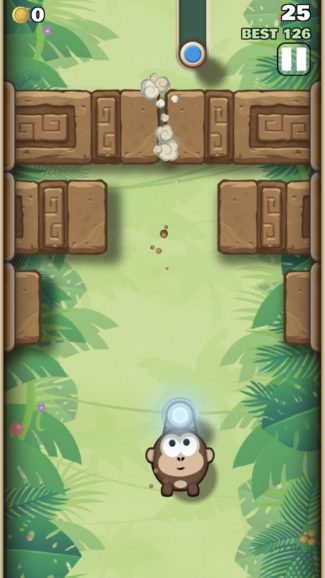Bastion
LQ: 9.15
Recommended Age: 10+
Skills Used: Planning, Working Memory, Mathematics, Reading

Sling Kong is an easy-to-learn arcade style game. The graphics are cute and the obstacles and game boards are varied. The player must pull back on the monkey to sling him from peg to peg. As the player goes higher, progressing further on the game board, he or she must also avoid obstacles and hit moving pegs. There is also a prize wheel, different slings to collect (such as a moose), and occasional events. Over all, the effect is an easy-to-play, hard-to-master game that can easily keep the player’s attention.
This game has an ad after every few deaths, as well as in-app purchases, including coins (which can be used for purchasing turns on the prize board) and backgrounds. The ESRB rated Sling Kong E for Everyone and LW4K stands by this rating.
Sling Kong helps kids practice and improve the following skills:

Adapting and adjusting to changing conditions and expectations.
Sling Kong provides the player several opportunities to practice flexibility thinking skills. First, the game board changes every time the player begins a game. He or she can't just memorize the order of the obstacles and pegs. The player has to stay flexible and prepared for anything, dealing with change every time they start a new round of Sling Kong.
Secondly, there are a wide variety of obstacles, such as flaming flowers and moving pegs. Some pegs even have time limits. This means the player has to be prepared to deal with any type of obstacle and can't just learn one way to get around them.
Finally, only a small amount of the endless game board is visible at once. This means even if the player has a plan in mind, he or she has to be flexible about executing that plan because an unexpected obstacle--possibly one they've never seen before--may be hiding just out of the current view.
Developing and retaining information in our minds while working.
Sling Kong also gives the player the chance to practice their planning skills. Specifically, the player practices both short-term planning and problem solving skills. Short-term planning practice occurs because of the small amount of the board visible to the player. He or she may be able to see, at most, two or three pegs or obstacles. This means that that is all the further out the player needs to plan. If they don't take the time to plan for all of what they see, however, they will miss a peg or hit an obstacle and the round will be over. The quicker the round is over, the fewer coins the player earns.
The player also practices problem solving skills every time they face a new obstacle or a new combination of obstacles. He or she has to figure out the proper timing, angle, and even whether or not to bounce off a wall or block. In the case of a timed peg, they also have to be prepared to solve their next obstacle (or problem) quickly and calmly. If they take too long, the peg will disappear. If they go too quickly, they will be slinging their game piece without knowing where they want to aim it. In either case, missing the next peg means ending the round with fewer coins. And fewer coins means it takes longer to collect new kongs.
All membership plans come with full access to our entire suite of tools learning guides, and resources. Here are a few of the ones we think you’ll like the most: